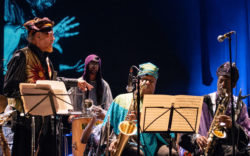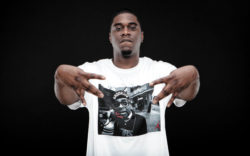In our main article on artist/activist/musician JD Samson, I referred to an op-ed she wrote for Huffington Post on the difficulties faced by working musicians, even those with above-average visibility. It features a great deal of candor, both regarding the world at large as well as her own faults. That article—”I Love My Job, But It Made Me Poorer”—can be found here. For contrast, a typical response can be found here. We’ll leave the conversation that was designed to emerge out of this editorial to our readership, but here’s my contribution: While it’s worthwhile to accept the circumstances one has found oneself in (being broke, having no health care, because one chose—key word—to pursue art), it’s equally valid to hope for something better (not having to stress out just because you are doing work you love). For additional context, here’s a complete Q&A we conducted with JD via telephone.
Flagpole: I’ve been listening to your new album, and I noticed that money is a reoccurring theme on the record, but it’s called Talk About Body. I wanted to ask you how money can have a lot to do with our bodies.
JD Samson: We didn’t even realize that money was such a huge topic in the record until we listened to the whole record; it was really funny. “Life’s Half Price,” the first song on the record, is a really good way to describe the way that money and body come together in a moment where we say, ‘I can’t afford to live in this body,’ you know? It’s just a constant discussion of your person and your humanity and stuff, and we have to figure out how to give ourselves health insurance and give ourselves food to eat and all these things that are all about our existence. One thing that I’ve always thought was important to talk about was identity politics, and that is very much a part of your class struggle as well as your gender identity and sexuality and all those things. I think they all kind of go hand in hand.
FP: Taking just the topic of same-sex marriage, a lot of people get angry that there are so many rights not afforded to LGBT couples because of them not being able to get married. Do you fall into the camp that says, ‘Everyone should be able to get married so they can be afforded these rights,’ or do you feel like marriage is a foregone thing that should be phased out in general?
JS: We have this song called ‘Credit Card Babies’ that’s about gay people having babies, and how expensive it can be, and that’s another way that bodies and finances come together on the record. We definitely feel like there’s a double-edged sword, and that song is interesting because the first verse is very clearly about how we want to have kids, and then the second one is like, but wait, do we? And I think that’s something interesting about our band: we’re not necessarily preaching our answers, we’re just giving this kind of reality check or displaying the options. And I think that’s important for us to do as queers, not to necessarily take a certain standpoint and say, ‘This is how you have to think. This is how it has to be,’ but, ‘This is what is going on. You tell me what you want to do then.’ And I think it’s been really cool, because I don’t always know how I feel about gay marriage. I’ve always wanted to get married, but I don’t know if that’s just the traditional cultural kind of thing that my family has always kind of made important, and so it seems important to me, and to be honest with you, I don’t really care what other people do. It’s just more about the idea of thinking about it and creating equality for everyone to be able to do whatever the fuck they want, you know?
FP: Do you subscribe to the belief that it is more financially difficult to be queer because people in power are interested in maintaing a society that is always reproducing or buying and creating more consumers?
JS: I think, especially right now, we’re living in a society where there’s such recession that whoever has the most amount of money is more respected. And I think that’s very clear to me as a queer woman. I think queer women are known to have less money than queer men, or straight women, or straight men. And I think that it’s a really interesting thing to be in, because people even say, ‘I’m not going to have a lesbian party, they never even tip.’ Even in the queer community, it’s well known that lesbians are poor. And I think it’s really funny, because I do find myself walking around expecting that people are going to think of me in a certain sense. And I don’t know–we all know the percentages, and we all have to feel that must be the truth, and I hope that that can all even out at some point, but I think we’re all in the same position right now. The economy is fucked, and we all know that.
FP: Where do you see LGBT progress right now? Are we living in a good time, are we moving backwards? Do you feel like progress is being made?
JS: I think that there’s definitely progress being made. People ask me all the time about ‘The L Word’ or whatever, and they’re like, ‘Don’t you think it’s horrible? People will get the wrong sense of what we’re about!’ And I think that’s true, it isn’t always necessarily exactly what it’s like for everybody in the world, but again, there’s just haters out there. And I think it’s important that there’s visibility, no matter what kind of visibility it is. When you see gay people on the news, or if you see TV shows with gay characters, it might not sink in that that’s activism, but it really is. Because what we’re doing is creating visibility and just making it normal, and whether that’s in the mainstream media or whatever, I think it’s good, and that’s just always been my standpoint.
FP: What inspired you to write the Huffington Post editorial, and why did you choose that outlet?
JS: They actually asked me to start blogging for them, and suggested that I write about something that would create a conversation, and at the time that’s what I was feeling, so I just thought that was a good opportunity for me to write about what I was feeling about put it out into the world and see what happened.
FP: Have you seen the kind of conversation you wanted emerging from that?
JS: I’ve actually received hundreds of letters from people thanking me, and it’s been really amazing to kind of feel the support that I have. And I definitely have gotten a positive reaction from my peers and from a lot of people in my generation; I think a lot of people who are not my peers and are not in my generation have been complaining, but the truth is I’m just saying what we said in the record, but it’s just a different format that perhaps reached more people. It’s interesting to me; as a musician, you always think your specific art form is going to be the thing that crosses you over where you can get your feelings out, but I guess for me in this particular situation, writing a blog was something that something that really pushed me outside of my normal fan base. And I think that’s really great and exciting, but I wasn’t aware that that was going to happen, so it’s been kind of a shock for me. It was a really vulnerable, personal piece, so I think putting it out there for that many people was actually scary and it’s been a really interesting time for me. But I think it’s just important to realize that, like I said before, the economy is fucked, and that’ basically what I said. Telling that personal story just helps people to find a context to put it in and to understand that it affects everybody. Right now in the world, fame and celebrity hold a status above everybody else, and I think that maybe what I’m trying to say is that that’s not real, you know?
FP: I realize you said earlier that you were more interested in posing questions, but what sort of solutions do you feel you might offer up to someone who could enact policy that might help musicians in the United States?
JS: My friends have this group called W.A.G.E. that is creating benefits for artists which It ink is really awesome, and they’ve been trying very hard to get grants and to get money from the government to try to help, and I think that’s important. I think the Freelancer’s Union is a really great place, too, but I think the number one of what we really need to do is take our money out of banks and put it into credit unions, etc., because we’re just creating this fucked up economy and not knowing what’s happening with our own money. I mean, we work so fucking hard to get it figured out and to make money and to be able to eat and have health insurance but then we’re just throwing it in a bank and just letting someone we don’t’ trust take care of it. That’s all I can say right now; other than that, all I can say other than that is that going to occupy wall street is actually a really important thing right now. It’s a really interesting time; when Occupy Wall Street started, people thought that there wasn’t enough of a reason for why they were protesting and that it wasn’t specific enough, but this is exactly what we needed in this country. We needed something that was more broad-based so that people could feel like no matter what they were feeling, no matter where their angry came from, they were invited. And I think the internet has spread people thin in terms of protest, because the protests have been getting more and more specific, but this is exactly what we needed, to come together to fight back. That’s what people need to do right now, if they want changed. They need to work for it.
Like what you just read? Support Flagpole by making a donation today. Every dollar you give helps fund our ongoing mission to provide Athens with quality, independent journalism.










